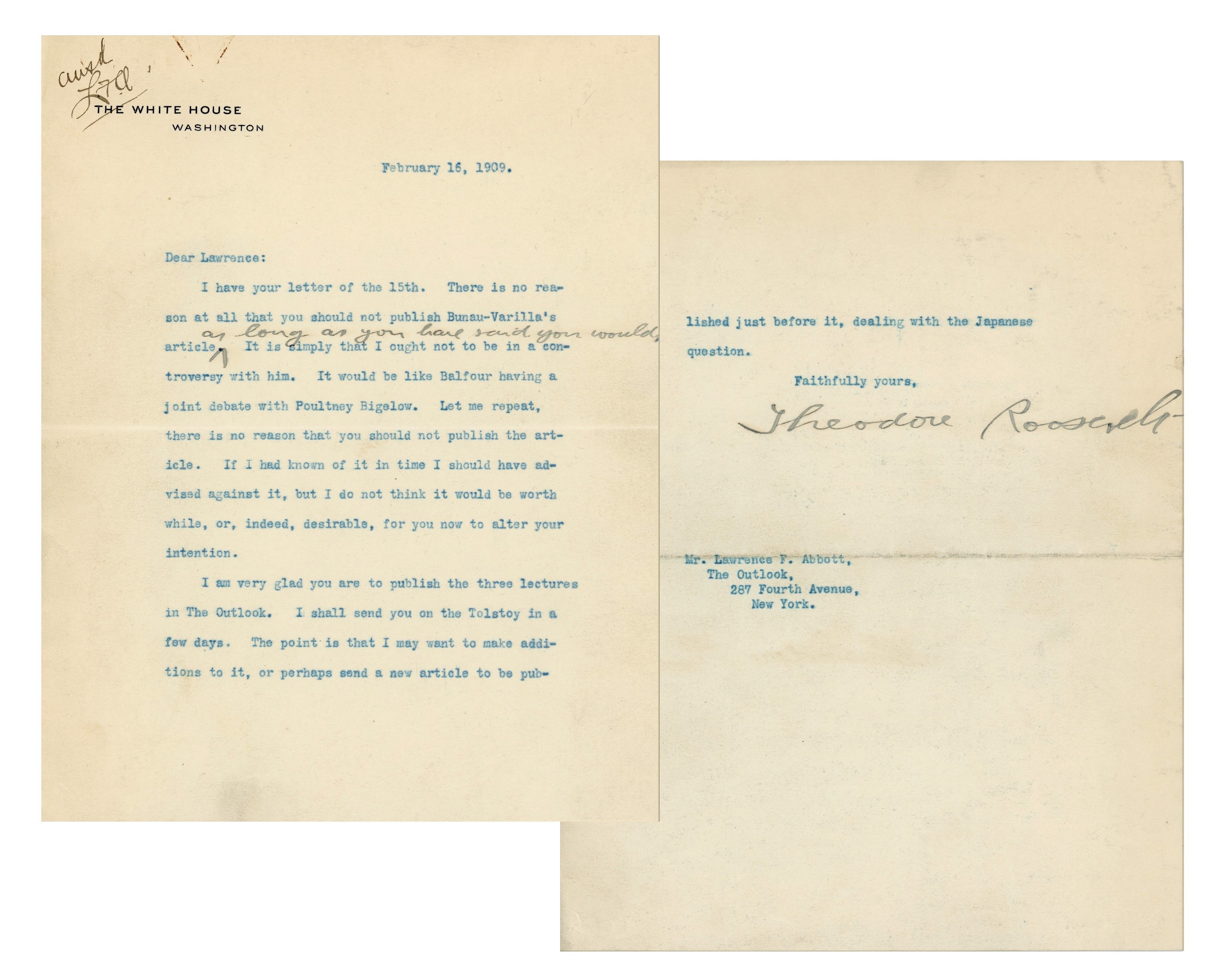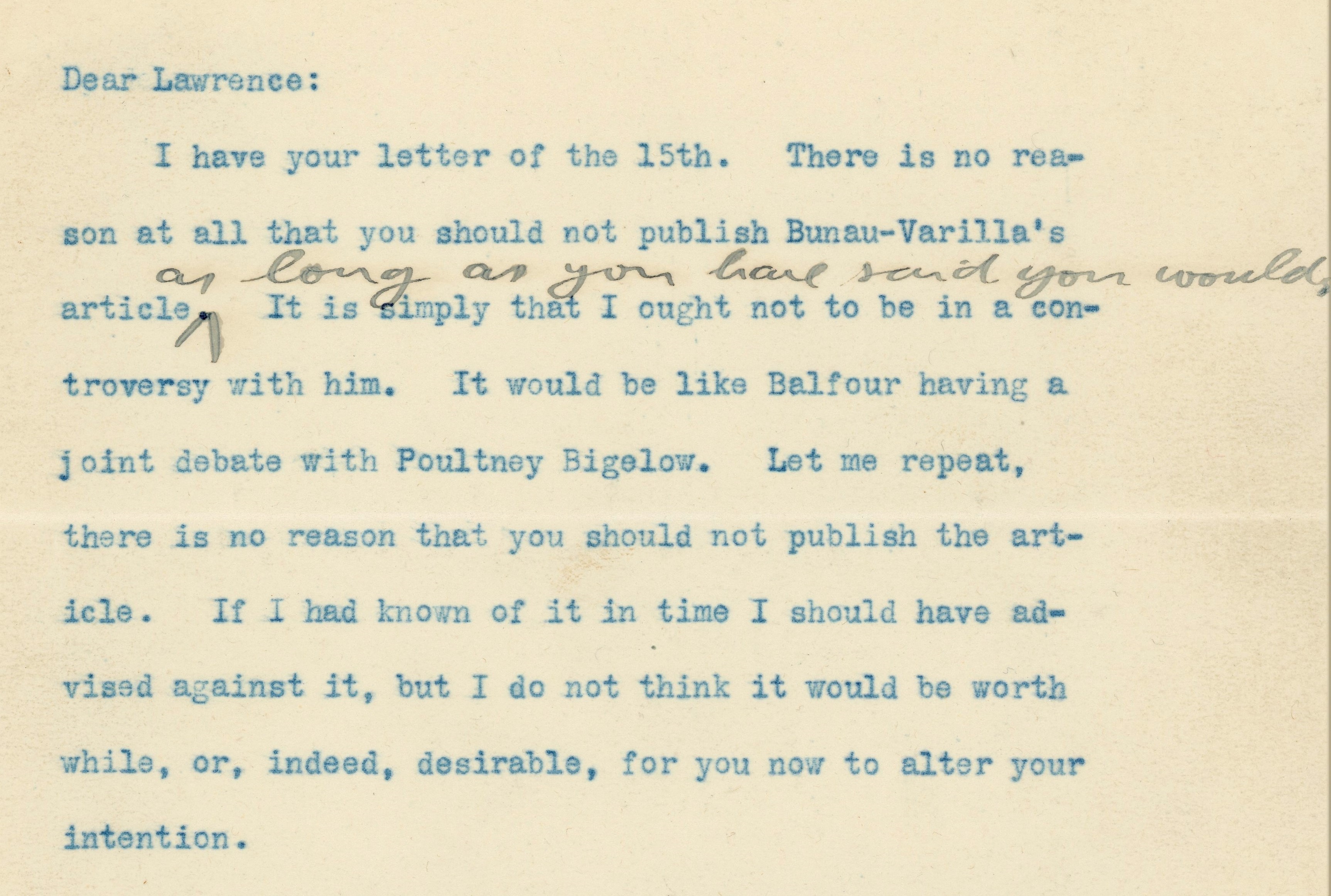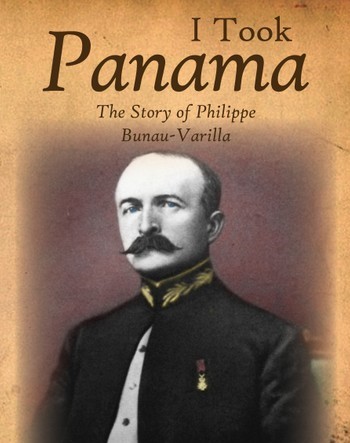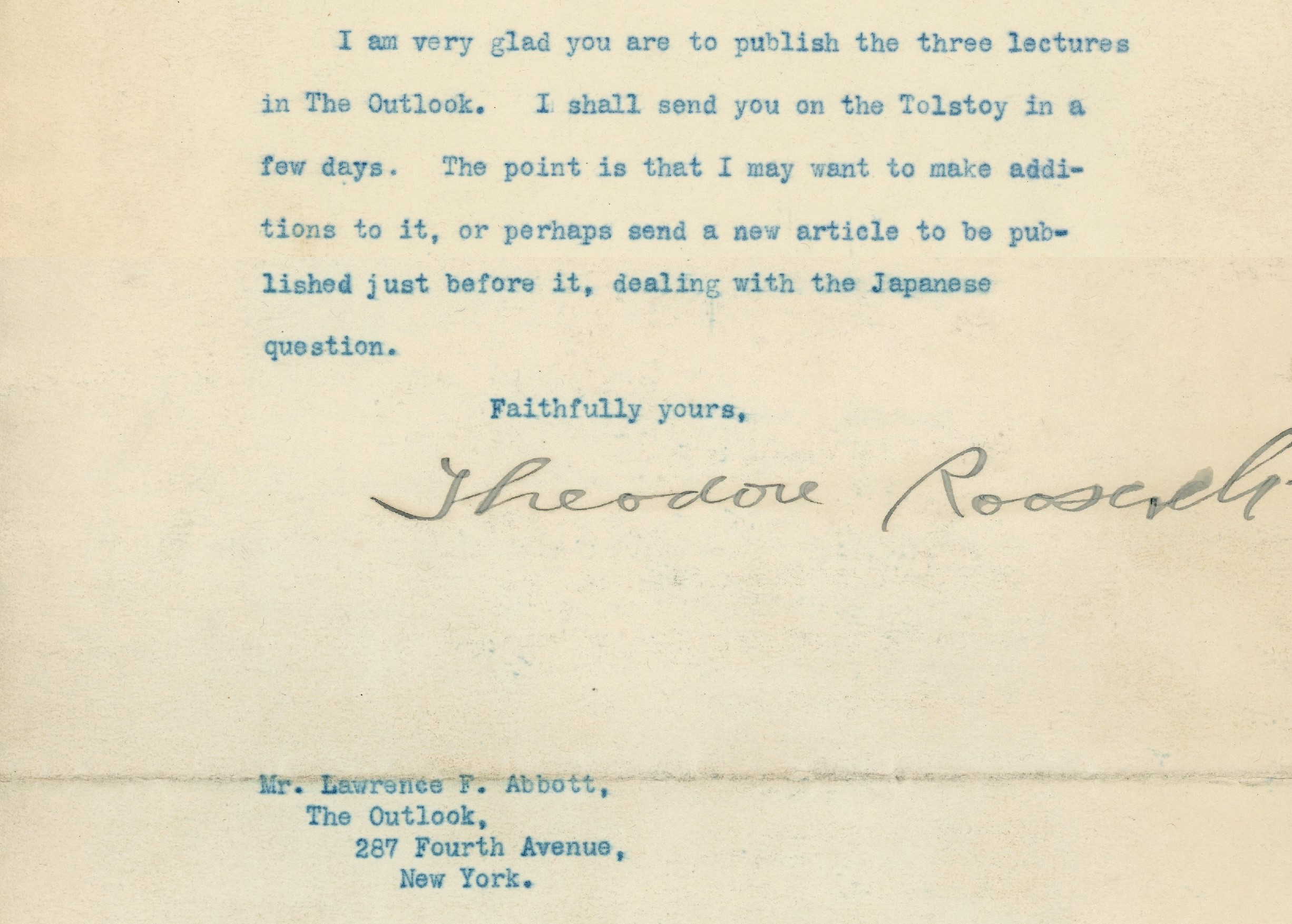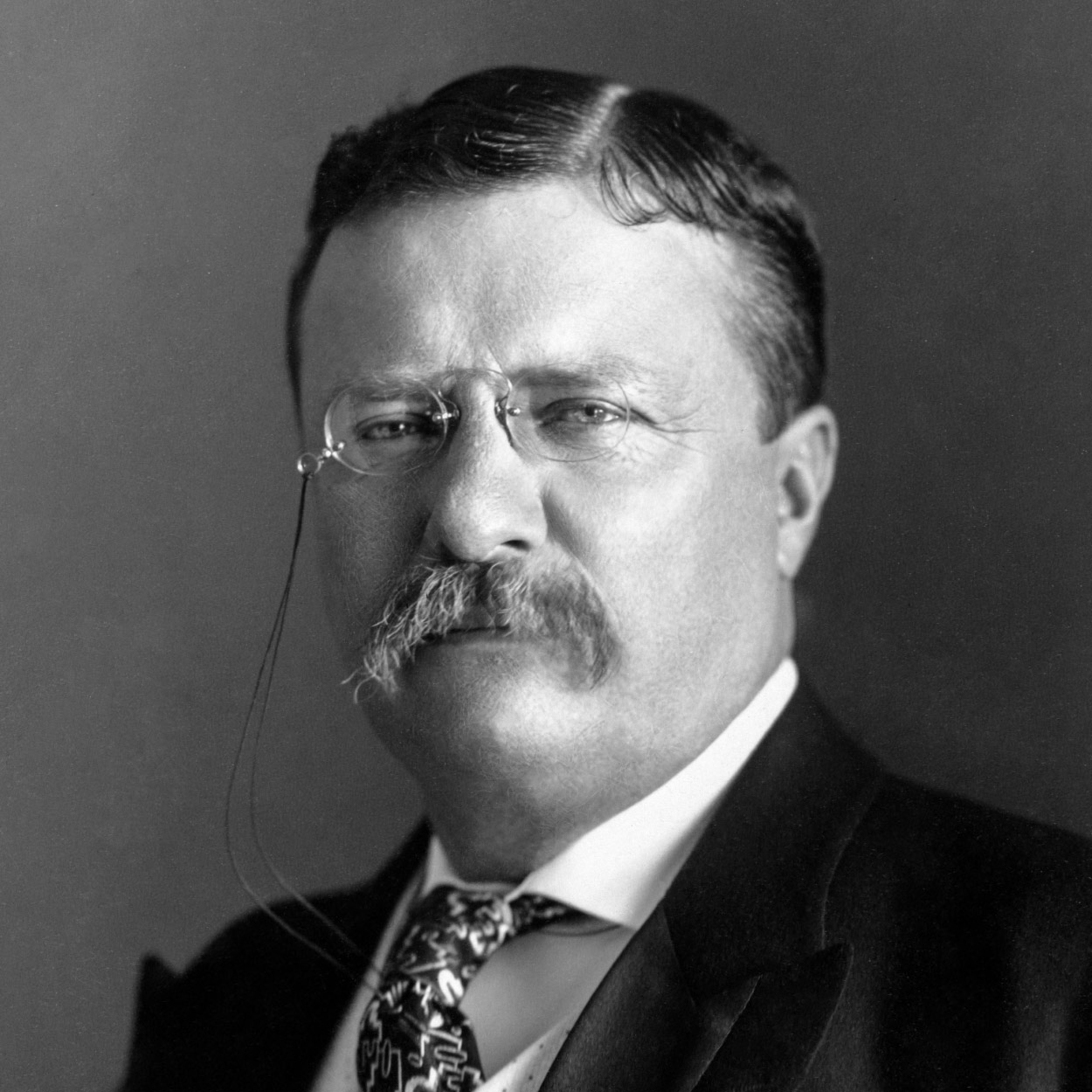Books are our stock-in-trade, but it is hard not to love letters. As we’ve written before, the published work of a seasoned author has inherent limitations. The very acts of drafting and editing, of expert input, careful consideration, and diligent preparation – these can deprive a published book of the immediacy of a moment or perspective. Leave the ink a little too dry on paper that’s just a bit too clean.
But letters. Even from the most careful and polished of writers, letters incline to be more ephemeral, more candid, more distinctly in and of the moment. Often the glimpse a letter offers is only tantalizingly small and beguilingly brief … but tantalizing and beguiling nonetheless.
Which brings us to the subject of this post – a typed, hand-emended, and signed 16 February 1909 letter on White House stationery from President Theodore Roosevelt to his friend, Lawrence F. Abbott, editor of the weekly newspaper The Outlook. The letter, dated just 16 days from the end of Roosevelt’s presidency, touches on a person integral to the murky political machinations that gave birth to the Panama Canal, as well as Roosevelt’s imminent post-presidential future as a contributing writer to The Outlook.
The letter is printed on the first and final leaves of a folded, four-panel sheet of “THE WHITE HOUSE | WASHINGTON” stationery. Acknowledging Abbott’s letter “of the 15th” the letter states “There is no reason at all that you should not publish Bunau-Varilla’s article.” Tellingly, a hand-emended caveat added by Roosevelt reads “as long as you have said you would.” From there, the first paragraph – particularly coming from the famously un-reticent “Bull Moose” Theodore Roosevelt – is a study in conflicted political doublespeak.
Roosevelt spends the rest of the paragraph – four more sentences in fact – continuing to express what can only be considered a dutifully professed but obviously reluctant and qualified accommodation.
“It is simply that I ought not to be in a con-
troversy with him. It would be like Balfour having a
joint debate with Poultney Bigelow. Let me repeat,
there s no reason that you should not publish the art-
icle. If I had known of it in time I should have ad-
vised against it, but I do not think it would be worth-
while, or, indeed, desirable, for you now to alter your
intention.”
Interleaved with “Let me repeat, there is no reason that you should not publish the article” and “I do not think it would be worth while [sic]… for you now to alter your intention” are the obvious reservations “…I ought not to be in a controversy with him… It would be like Balfour having a joint debate with Poultney Bigelow… If I had known of it in time I should have advised against it…” The net effect is of TR seeming to claim high moral ground and not press presidential prerogative while clearly wanting and wishing to say no to publishing the article in question.
Why? Well, we can only speculate.
Roosevelt’s manifest concern about an article by Bunau-Varilla (and Lawrence’s attendant sensitivity to Roosevelt) is both intriguing and unsurprising. Philip Bunau-Varilla (1859-1940) greatly influenced the selection of the construction site for the Panama Canal and surreptitiously collaborated with Roosevelt in the orchestration of the Panamanian Revolution.
A Frenchman, Phillipe Bunau-Varilla was integral to the diligent lobbying and dubious political machinations that resulted in the Panama Canal. Bunau-Varilla was no ineffectual dilettante, but truly a relentless, shaping force. “..so Gallic was he in his gamecock fierceness, all frown and spiked mustaches. Had he stood a foot taller, he might have looked as formidable as he in fact was. He had the bruising willpower and aristocratic intelligence of the best French education d’elite. Yet he had earned that privilege through scholarships. His great wealth… was self-made.” (Morris, Theodore Rex, pp.85-86)
A decade and a half before Roosevelt’s presidency, Bunau-Varilla had risen to become chief engineer of a preceding canal attempt. Like Roosevelt, he was enamored not only of the feasibility and practicalities, but of the great Idea of the canal. While “it is difficult to apportion the credit for the choice of Panama… Certainly Bunau-Varilla… performed miracles.” (Pringle, Theodore Roosevelt, p.216)
The pertinent parts of this very complicated story will have to be summarized. When Columbia balked at a Canal treaty, Bunau-Varilla was integral to the solution. He met with Roosevelt at the White House in October 1903 and circumspectly discussed Columbia, a notional Panama, and Canal prospects. By mid-November, Bunau-Varilla had conspired, with U.S. support, to foment the “revolution” that resulted in the secession of Panama and the immediately subsequent Canal treaty with Panama. This was executed by Bunau-Varilla as the expeditiously and very briefly vested “Minister Plenipotentiary of the Republic of Panama”, who managed to conclude the treaty hours before the Panamanian diplomatic delegation reached Washington and learned of the fait accompli.
Courtesy of Bunau-Varilla, Roosevelt had plausible deniability, a favorable treaty, a lynchpin of his legacy, and the means for an interoceanic express route for the American Navy. No surprise, then, that Roosevelt might feel conflicted about a notional article by Bunau-Varilla.
Bunau-Varilla would incur the lasting resentment of Panamanians, but would nonetheless live “to lose a leg at Verdun and to stump the boulevards of Paris with the rosette of the Legion of Honor in his buttonhole.” (Pringle, Theodore Roosevelt, p.212)
There is, of course, more to the letter.
“I am very glad you are to publish the three lectures
in The Outlook. I shall send you on the Tolstoy in a
few days. The point is that I may want to make addi-
tions to it, or perhaps send a new article to be pub-
lished just before it, dealing with the Japanese
question.”
In the letter’s second and final paragraph, Roosevelt bends his attention to his imminent, post-presidency “Contributing Editor” role. Roosevelt refers to forthcoming publication of “three lectures in The Outlook, as well as forthcoming pieces on Tolstoy and a piece “dealing with the Japanese question”. After the typed valediction “Faithfully yours,” Roosevelt signed “Theodore Roosevelt” in the same ink as the emendation. Abbott’s name and New York address are typed thereafter.
The letter’s recipient, Roosevelt’s close friend Lawrence Fraser Abbott (1859-1933), was to become Roosevelt’s editor and nominal boss weeks after this letter was written, and would write about Roosevelt following his death in 1919 (Impressions of Theodore Roosevelt). In 1908, as he contemplated the end of his presidency, Roosevelt had no shortage of lucrative, prestigious, and high-profile employment prospects, including a number of offers from publishers. “Roosevelt let his conscience, rather than greed, guide him. He had long ago been approached by the father-and-son team of Lyman and Lawrence Abbott to join their magazine, Outlook, as a contributing editor writing on current affairs… Although Outlook was not a wealthy periodical, its middle-class, mildly progressive profile appealed to Roosevelt” and “He gratefully remembered its support during the crises and controversies of his presidency…” So it was that the Abbotts proudly announced, on 7 November 1908, that “on or after the 5th of March, 1909, Theodore Roosevelt will be associated with Outlook’s editorial staff as a special Contributing Editor.” (Morris, Theodore Rex, pp.540-41) Roosevelt would continue in that role until his death.
Statesman, reformer, explorer, naturalist, soldier, rancher, and author, Theodore Roosevelt (1858-1919) was the 26th and youngest ever U.S. president, both herald and agent of America’s assumption of global power. Before the Spanish-American War, as Under-Secretary of the Navy Roosevelt pushed the boundaries of his authority to prepare the American Navy, enabling decisive victory over the Spanish at Manila Bay. But no sooner had Congress declared war on Spain, on April 25th 1898, than Roosevelt declared he would resign to volunteer for the army, contrary to wishes of his friends, colleagues, and President. Roosevelt’s charge up San Juan Hill with his “Rough Riders” became emblematic of his boldness, courage, and unapologetic assertion of both moral and military American hegemony. However, more substantively, it was the Panama Canal – the great linking of the Atlantic and Pacific oceans, bisecting, empowering, and asserting the western hemisphere, that would indelibly embody Roosevelt’s unfettered ambitions for America.
This item may be purchased HERE.


